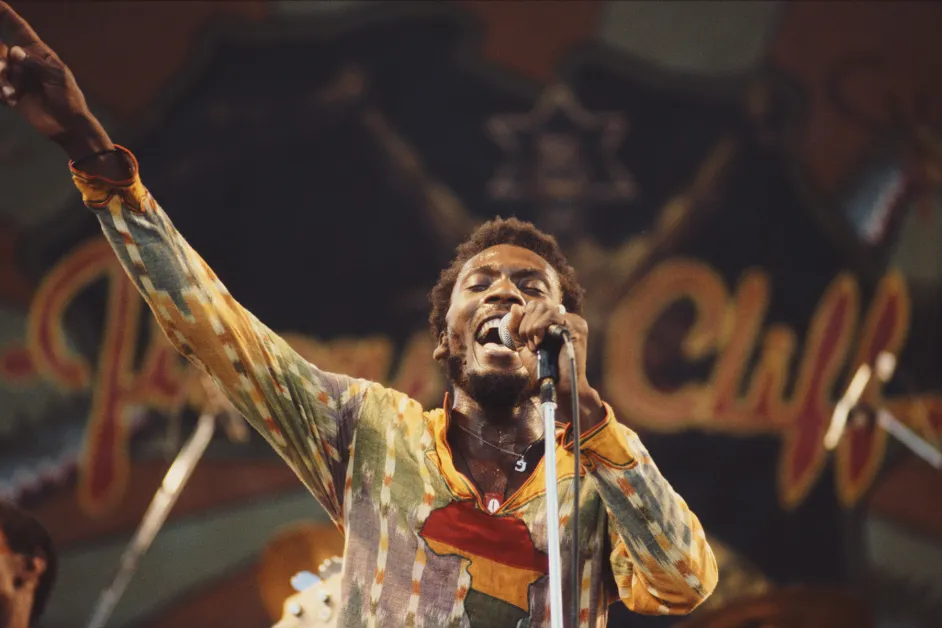
Jimmy Cliff stands among the most influential figures in Jamaican music and one of the most important ambassadors of Caribbean culture in the 20th and 21st centuries.
A singer, multi-instrumentalist, actor, and songwriter, Cliff’s contributions helped push ska, rocksteady, and reggae from local Jamaican styles to global cultural forces. His voice—clear, emotional, and spiritually charged—became a symbol of resilience and hope, while his acting performances brought Jamaica’s stories to screens worldwide. His decades-long career, marked by reinvention, experimentation, and unwavering dedication to social consciousness, established him as a towering figure in international music history.
Early Life and Childhood
Jimmy Cliff was born James Chambers in Somerton District in St. James Parish, Jamaica, on July 30, 1944.
He entered the world under dramatic circumstances—a hurricane raged outside as his mother gave birth. His early years unfolded in a rural, agricultural setting, marked by the close-knit community life typical of mid-20th-century Jamaica. Cliff displayed a strong interest in music from childhood, writing songs and absorbing the vibrant sound-system culture that surrounded him. These early experiences laid the foundation for a future in music that would ultimately connect him to millions across continents.
In his teenage years, Cliff moved to Kingston with his father. Like many young Jamaicans with artistic ambitions, he saw Kingston as the epicenter of opportunity—a place where musicians, producers, sound systems, and recording studios created a lively, challenging, and inspiring environment. The move proved transformative. Within a short time, he was introduced to the world of professional music production.
At age 14, Cliff achieved his first Jamaican hit with “Hurricane Hattie.” The song, produced by Leslie Kong, helped establish Cliff as a gifted young singer with strong potential. Over the next several years, Cliff recorded additional singles and began to build a reputation as a rising talent in Jamaica’s quickly evolving music scene.
Rise Through Ska and Rocksteady
The 1960s marked an important time in Jamaican music. Ska, the upbeat, brass-driven style that preceded reggae, was sweeping the island. Jimmy Cliff, still a teenager, became part of this revolution, recording energetic, dance-ready tracks that captured the era’s youthful optimism. He also began to explore rocksteady—a slower, more soulful style that bridged ska and reggae.
His early hits reflected his versatility: love songs, social commentaries, and lively dance tracks. Labels and producers took note of his range and his unique voice, which combined sweetness with emotional intensity. Cliff’s early work in these genres built the foundation for what would become a monumental career.
A major turning point came in 1964 when Cliff represented Jamaica at the New York World’s Fair, a global showcase that exposed him to international audiences. This opportunity helped propel him toward a recording contract with Island Records and eventually led him to relocate to the United Kingdom. There, he broadened his musical horizons, integrating elements of American soul, British pop, and global rhythm traditions into his developing sound.
International Breakthrough
Jimmy Cliff’s early international releases introduced him to new listeners and critics outside Jamaica, but it was in the late 1960s and early 1970s that he experienced major stylistic breakthroughs. During this period, Cliff composed and recorded several of his most enduring songs.
One of these was “Many Rivers to Cross,” a soulful ballad expressing the loneliness and frustration he felt during periods of struggle in London. The song’s gospel-inspired arrangement and heartbreaking vocal performance made it one of the most powerful pieces in his catalog. Even decades later, it remains one of the most covered and celebrated reggae songs in history.
.
Cliff also released albums that blended Jamaican rhythms with universal themes of love, struggle, hope, and humanity. His music resonated across cultures and languages, reaching listeners in Europe, the Americas, Africa, and beyond. He became not only a musician but a cultural ambassador—someone who brought Jamaican identity to the world stage.
The Harder They Come: A Cultural Landmark
Jimmy Cliff’s most enduring contribution to global culture came from his starring role in the 1972 film The Harder They Come, directed by Perry Henzell. Cliff played Ivan Martin, an ambitious young man from the Jamaican countryside who moves to Kingston seeking fame as a singer but becomes entangled in crime, corruption, and despair.
The film was groundbreaking for several reasons:
1. It put Jamaican cinema on the map.
Before The Harder They Come, Jamaican stories had rarely been represented on film, let alone in authentic Jamaican patois and featuring real Jamaican actors, musicians, and locations. Cliff’s charismatic performance helped bring the film international acclaim.
2. It introduced reggae to the world.
The film’s soundtrack—featuring songs like “The Harder They Come,” “You Can Get It If You Really Want,” and “Many Rivers to Cross”—became one of the most influential in music history. It played a crucial role in globalizing reggae during a time when the genre was still emerging outside of Jamaica.
3. It provided a social critique.
The narrative highlighted issues of poverty, corruption, and systemic injustice in Jamaican society. Cliff’s portrayal of Ivan, a flawed but relatable dreamer, resonated with audiences worldwide and helped position him as a cultural voice for the oppressed.
The Harder They Come remains one of the most important films to emerge from the Caribbean and continues to be screened, studied, and admired globally. Through this single project, Cliff influenced not only music but cinema, political thought, and transnational cultural dialogue.
Musical Evolution and Continued Success
Throughout the 1970s, 1980s, and 1990s, Jimmy Cliff continued to evolve musically, releasing albums that showcased a blend of reggae, rock, pop, soul, and world music. He collaborated with numerous producers and musicians, exploring new sounds while maintaining the passion and sincerity that defined his earliest work.
Some highlights from his long career include:
- Socially conscious songs addressing war, poverty, and injustice.
- Spiritual compositions that reflected his evolving beliefs and search for meaning.
- Pop-influenced hits that broadened his global reach.
- Collaborations with younger artists, showing his commitment to nurturing new talent.
One of his most internationally recognized later-career performances was his rendition of “I Can See Clearly Now,” featured in the 1993 film Cool Runnings. The song reached new generations and further cemented Cliff’s status as a global music icon.
He continued touring extensively, performing at festivals, concerts, and cultural events across Europe, the Americas, Africa, and Asia. His live performances remained energetic and spiritually uplifting, often featuring extended instrumental sections and call-and-response interactions with audiences.
Awards, Distinctions, and Honors
Jimmy Cliff’s contributions did not go unrecognized. Over the course of his lifetime, he received numerous awards, distinctions, and national and international honors. Among the most notable was Jamaica’s Order of Merit (OM)—one of the highest honors awarded by the Jamaican government, given for exceptional contributions to the arts and sciences.
Cliff was also inducted into the Rock & Roll Hall of Fame, becoming one of the few reggae artists to receive that recognition. Numerous other awards—including Grammy wins—highlighted his creative brilliance and cultural impact.
Personal Life and Spiritual Journey
Jimmy Cliff’s personal life was marked by complexity and introspection. Raised in a Christian environment, he later explored other spiritual paths, including Rastafarianism and Islam, before eventually adopting a more universal spiritual identity. He often described himself as someone searching for truth in all traditions, blending philosophical reflection with personal experience.
He was married and had children, including several who carried on artistic and creative pursuits of their own. Cliff was known as a private yet thoughtful individual, someone who balanced the demands of global fame with a strong sense of personal and cultural identity.

Later Years and Final Works
Even in his later years, Jimmy Cliff remained active creatively. He continued recording and releasing new music, often addressing contemporary issues such as displacement, migration, and global unrest. His later albums demonstrated that he had lost none of the fire, compassion, or musical curiosity that defined his youth.
He collaborated with younger musicians and producers, ensuring his sound stayed fresh while still honoring his musical roots. His voice, though seasoned with age, retained its clarity and emotional resonance.
Death and Global Mourning
Jimmy Cliff died on November 24, 2025 at the age of 81.
Legacy
Jimmy Cliff’s legacy extends far beyond music. His body of work—spanning ska, rocksteady, reggae, pop, soul, and world music—demonstrates unparalleled versatility. His film roles, especially in The Harder They Come, immortalized him as a symbol of Jamaican identity and the struggles and triumphs of ordinary people.
His songs continue to be covered, sampled, and studied. His influence can be heard in reggae, ska revival movements, pop, hip-hop, and global fusion genres. Beyond his artistic contributions, Cliff’s message of hope, resilience, and human unity remains as powerful as ever.
He taught the world that music could heal, liberate, and inspire.
He embodied Jamaica’s spirit on the world stage.
He proved that one person, armed with a voice and a mission, could change the cultural landscape of an entire era.
Check out Jimmy Cliff on Amazon by clicking here.
If you found this interesting please share it with your friends and family, and check out some of our other articles on Musicians who Died in 2025.
.

